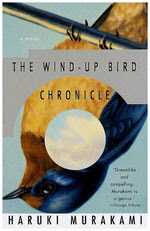 |
| Amazon |
 |
When the phone rang I was in the kitchen, boiling a potful of spaghetti and whistling along with an FM broadcast of the overture to Rossini's The Thieving Magpie, which has to be the perfect music for cooking pasta."
Thus the mystery begins for Toru Okada, an easy-going young man in Tokyo who recently quit his unfulfilling job without knowing exactly what he was going to do next. On the phone is a mysterious woman with a sexy voice. Before long, Okada is in search of his lost cat, then his missing wife, then explanations for all the odd characters and implausible coincidences that complicate his simple life.
After the jump, my review.
Grade: B+
This long novel (published in three volumes in Japan, and in a one-volume English translation in 1997) is the fourth by Haruki Murakami that I've read recently. All are distinctively Murakami. They contain such a mixture of the mundane and the bizarre that it is sometimes hard to tell exactly what's real and what's dream or imagination. Is The Wind-Up Bird Chronicle a love story? A detective story? A study of evil in war and politics? Yes to all. It's impossible to categorize a Murakami novel. The secret to enjoying Murakami is in your ability to set aside your questions and doubts and just follow him where he takes you.
Toru Okada is at the center of it all. The novel alternately lays out the stories of the various people Okada meets (the structure of interleaved stories is another characteristic of a Murakami novel). There's Okada's wife Kumiko who fails to come home from work one day. There's his brother-in-law Noboru Wataya, a politician who is a dark figure who may or may not be behind his wife's disappearance. There's the bubbly sixteen-year-old girl who lives down the alley from Okada, across from the house Okada is drawn to. The house is supposedly jinxed by the previous owner who hanged himself. There are the psychic sisters Malta and Creta Kano, and the psychological healers, the mother-son duo of Nutmeg and Cinnamon. There's Lieutenant Mamiya who has a story about a World War II atrocity in Manchuria that seems to be connected to Okada's own situation today. All of these characters provide the pieces of the jigsaw puzzle that is The Wind-Up Bird Chronicle.
As Murakami introduces each of these characters and tells their stories, they at first appear to be independent, but gradually connections are revealed. It would be a major spoiler to reveal how this all works out. Let me just say that the resolution of the different threads of the story is probably the most controversial aspect of the novel. Murakami spins so many webs that it's understandable if he leaves a few loose ends for the reader to ponder over at the end. I, for one, don't see that as a flaw. I get the feeling Murakami did it all on purpose. If you are the kind of reader who can overlook some loose ends and admire the grand scale of the whole effort, then The Wind-Up Bird Chronicle just might find a place near the top of your list of favorites.

No comments:
Post a Comment